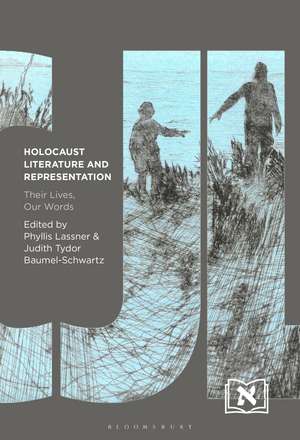Holocaust Literature and Representation: Their Lives, Our Words: Comparative Jewish Literatures
Editat de Phyllis Lassner, Judith Tydor Baumel-Schwartzen Limba Engleză Paperback – 21 aug 2024
| Toate formatele și edițiile | Preț | Express |
|---|---|---|
| Paperback (1) | 191.56 lei 3-5 săpt. | |
| Bloomsbury Publishing – 21 aug 2024 | 191.56 lei 3-5 săpt. | |
| Hardback (1) | 539.84 lei 6-8 săpt. | +115.06 lei 7-13 zile |
| Bloomsbury Publishing – 8 feb 2023 | 539.84 lei 6-8 săpt. | +115.06 lei 7-13 zile |
Preț: 191.56 lei
Preț vechi: 249.48 lei
-23% Nou
Puncte Express: 287
Preț estimativ în valută:
36.65€ • 38.37$ • 30.33£
36.65€ • 38.37$ • 30.33£
Carte disponibilă
Livrare economică 15-29 martie
Preluare comenzi: 021 569.72.76
Specificații
ISBN-13: 9781501391637
ISBN-10: 1501391631
Pagini: 258
Ilustrații: 21 bw illus
Dimensiuni: 152 x 229 x 25 mm
Greutate: 0.35 kg
Editura: Bloomsbury Publishing
Colecția Bloomsbury Academic
Seria Comparative Jewish Literatures
Locul publicării:New York, United States
ISBN-10: 1501391631
Pagini: 258
Ilustrații: 21 bw illus
Dimensiuni: 152 x 229 x 25 mm
Greutate: 0.35 kg
Editura: Bloomsbury Publishing
Colecția Bloomsbury Academic
Seria Comparative Jewish Literatures
Locul publicării:New York, United States
Caracteristici
Presents first-person stories about the "real people" writing the most influential books on Holocaust literature and representation
Notă biografică
Phyllis Lassner is Professor Emerita in the Crown Center for Jewish and Israel Studies, Gender Studies, and Writing Programs at Northwestern University, USA. She is author of numerous books and articles on Holocaust literature and representation including as co-editor of the Palgrave Handbook of Holocaust Literature and Culture (2020).Judith Tydor Baumel-Schwartz is Director of the Arnold and Leona Finkler Institute of Holocaust Research, the Abraham and Edita Spiegel Family Professor in Holocaust Research, the Rabbi Pynchas Brener Professor in Research on the Holocaust of European Jewry, and Professor of Modern Jewish History at Bar-Ilan University, Israel. She is also editor of several compilations of academic autobiographies, including co-editor of Her Story, My Story? Writing about Women and the Holocaust (2020).
Cuprins
IntroductionPhyllis Lassner, Northwestern University, USA, and Judith Tydor Baumel-Schwartz, Bar-Ilan University, IsraelPart I: North America1. Voices from the Past Victoria Aarons, Trinity University, USA2. Movies as Prosthetic Holocaust MemoriesLawrence Baron, San Diego State University, USA3. Personal and Professional Autobiographies: Reechoing Memories of the HolocaustRachel Feldhay Brenner, University of Wisconsin-Madison, USA4. A Winding RoadMargarete Myers Feinstein, Loyola Marymount University, USA5. Biographia Literaria FeminisitaSara R. Horowitz, York University, Canada6. My Journey into the ShoahDavid Patterson, University of Texas at Dallas, USA7. My Holocaust Autobiography: The Mortal StormAlexis Pogorelskin, University of Minnesota-Duluth, USA8. Gendered Encounters: The Holocaust and Life WritingRavenel Richardson, Case Western Reserve University, USAPart II: Great Britain9. Before the Gate of MemoryJoshua Lander, Independent Scholar, UK10. I Am Not Jewish Joanne Pettitt, University of Kent, UK11. Representing the Holocaust in BritainSue Vice, University of Sheffield, UKPart III: Israel12. Following the Footsteps of Claude Vigée: From the Holocaust Trauma to a New Science of Judaism Thierry J. Alcoloumbre, Bar Ilan University, Israel13. Where Did Those People Go?Karen Alkalay-Gut, Tel Aviv University, Israel14. Untold Story, Indirect Course: My Path into the Field of Holocaust Literature and RepresentationMichal Ben-Horin, Bar-Ilan University, Israel15. Too Much, Too Little: A Personal Journey through Holocaust Narratives Keren Goldfrad, Bar-Ilan University, Israel16. "Why Don't You Move On?": A Sort of Play in Three Acts and Three Standing OvationsRoy Horovitz, Bar-Ilan University, Israel 17. Intersecting Narratives: When East Meets West Yvonne Kozlovsky-Golan, University of Haifa, Israel18. Voicing the UnvoicedLiliane Steiner, Hemdat Hadarom College, Israel19. How Literature Chose Me Bela Ruth Samuel Tenenholtz, Bar-Ilan University, IsraelNotes on ContributorsIndex of PeopleIndex of PlacesIndex of Organizations
Recenzii
This collected volume of academic autobiographical essays constitutes an innovative perspective on exploring Holocaust history and commemoration based on the personal narratives of scholars who engage in Holocaust representations. The stories reveal a wide range of approaches to working on the topic and the authors' diverse experiences while conducting their research. The volume thus provides a highly important behind-the-scenes glimpse of the ways the Holocaust has influenced and shaped the professional lives of scholars with different national, cultural, and generational identities in the USA, Britain, and Israel. It makes a special contribution to Holocaust scholarship by underscoring how the Holocaust past remains a haunting present.
Rarely does an academic book about Holocaust representation move me so deeply. These beautiful essays pay homage to the idea of 'journey,' of the role of serendipity, deliberation, and reflection on the path, offering personal stories and histories that will feel familiar, intimate, and challenging.
This is a book equivalent of the intimacy of sitting down with a colleague and asking them just how they ended up researching what they do. Their moving and insightful responses reveal the influence of people and texts as well as the importance of the shifting national contexts of post-war America, Britain and Israel on research in Holocaust literature and representations. Reading this book not only do you get to know the scholars featured here better, but also the evolution of a field that they have pioneered and contributed to.
Rarely does an academic book about Holocaust representation move me so deeply. These beautiful essays pay homage to the idea of 'journey,' of the role of serendipity, deliberation, and reflection on the path, offering personal stories and histories that will feel familiar, intimate, and challenging.
This is a book equivalent of the intimacy of sitting down with a colleague and asking them just how they ended up researching what they do. Their moving and insightful responses reveal the influence of people and texts as well as the importance of the shifting national contexts of post-war America, Britain and Israel on research in Holocaust literature and representations. Reading this book not only do you get to know the scholars featured here better, but also the evolution of a field that they have pioneered and contributed to.





